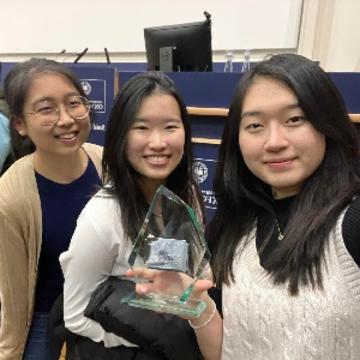Kezia Susanto, Zheqing Zhang & Wanlin Xiao, co-founders of i-Opto

Kezia Susanto (4th year Engineer), Zheqing Zhang (3rd year Medic) and Wanlin Xiao (3rd year PPEist) are the team of Exeter students, and friends, behind i-Opto, a tele-optometry app in development which will make it possible to undergo eye examinations from the comfort of your home. The app will offer up to 6 different eye tests. One of the tests, the digital visual acuity test, makes use of a digitalised version of the Snellen chart, the standardised, letter-based chart used by professionals across the globe, as well as voice processing technology which will enable the client to communicate directly with i-Opto’s virtual specialist. i-Opto will also offer at-home testing kits, making optometric care easy and accessible for all. While only in the beginning stages of its development, i-Opto is a promising innovation, bringing optometric care into the modern, digital age.
What is your background? What made you decide to get involved in supporting entrepreneurs?
[All] Well, we all met through the collegiate network at Exeter. Our diverse academic backgrounds provided a good jumping-off point for collaboration on this project, but I wouldn’t say there was a definitive moment when we decided that we wanted to move into the entrepreneurial space. The notion of creating something ourselves had always been appealing to us, for sure. [Wanlin] In all honesty, the idea for i-Opto came to me one day while I was just examining my phone camera and wondering what it might be capable of. It’s quite funny to think about really, but it was that creative curiosity that led us to the idea. From there, it was really just a case of brainstorming – taking that idea further and exploring the different avenues we might be able to go down in the development stage, in preparation for the All-Innovate Ideas competition, which is run through the Entrepreneurship Centre at the Saïd Business School.

[All] We wouldn’t necessarily call ourselves entrepreneurs just yet…but I guess you could say that entrepreneurship is the notion of bringing a new idea to life. At least, that’s the goal. It’s exciting to see ideas we come up with during conversations over dinner turn into something real. This beginning stage has been exhilarating – talking to people who hear our ideas and like them has been really rewarding. Realising that our ideas could have a real, positive impact has been a really empowering experience.
How and when did you know your idea was good enough to develop it?
[Wanlin] Of the three of us, Zheqing was the one who hopped on the opportunity and saw its potential after I came up with the idea and, I guess, “pitched” it to her in our kitchen. [Zheqing] My first impression was that it was definitely something that I, myself, would use. After doing some research, I realised that many people do not have access to optometry services or may have mobility issues that prevent them from visiting regularly. We realised the need for creating an app that would be a completely remote solution to this problem, as i-Opto provides a convenient way to access optometric care from the comfort of your home. It also appeals to the general public who may not attend regular eye check-ups due to financial strain or a busy schedule. We consulted Kezia, who has some knowledge in the field of machine learning and image processing, about whether the idea would be technologically feasible. [Kezia] I researched how that kind of technology has been integrated into the medical field, which is when I discovered that the technology was already there at our fingertips, for what we wanted the app to achieve.
What would you say are the top 3 skills that needed to be a successful entrepreneur? Why?
[ Kezia] Practically speaking, I think that research skills are definitely necessary to building on that first initial idea. [Zheqing] Secondly, I’d say creativity, for sure. You have to be able to think outside of the box and propose new solutions – which I guess is tied to problem-solving. Your initial idea may not always work, of course, so you have to be able to adapt. [Wanlin] To offer an extra skill, I’d say a healthy ego is also really important. Rather than tying your ego to one particular approach, you must be open to accept criticism – while still having enough self-belief to stand by the idea itself.
What individual, company or organization inspires you most? Why?
[All] A short while ago, we worked on a project with Edward Yee, a co-founder of Givfunds and Oxford Rhodes Trust scholar. Givfunds is a social impact organisation using venture capital to distribute low-cost loans to social organisations unable to access the funding they need to impact more lives in their communities. We find the work of both Edward and his co-founder, Irwan Malhotra, to be so inspiring. [Wanlin] Another person who comes to mind is my friend and Oxford graduate, Klau Chmielowska. She founded her own start-up called Lafiya Nigeria, which provides reproductive healthcare and family planning facilities to women in northern Nigeria. Her dedication to such an important cause is definitely a source of inspiration, for sure. Overall, I’d say there isn’t one specific story that stands out more than the others, rather the whole web of people around the world, making ripples of impact where they can. I’d say that’s the most inspiring thing of all – seeing that anybody can put in the effort to make a difference.
What has been your most satisfying or successful moment in business?
[All] We’d probably have to say finishing as a runner-up in the All-Innovate competition has been our most successful moment thus far. Having the opportunity to receive constructive criticism on the product is invaluable, but hearing positive feedback is so rewarding. Being told that your product has the potential to go far is an amazing feeling.
What would you say have been some of your mistakes, failures or lessons learned as an entrepreneur?
[Kezia] Realising that some elements of our idea may not be practically feasible was definitely a hurdle we had to overcome. For example, in the beginning stages of development, we realised that certain parts of the eye exam could not be totally digitalised in an app format. These include: the autorefractor and phoropter, the pressure test, and other tests which require a professional to interpret the photos, such as the slit-lamp exam and fundoscopy. For that reason, we had to scale back our approach, to adapt and revise our idea. I guess the take-away from that would be the importance of being agile; to accept that your initial idea will change as you encounter obstacles along the way.
How have you funded your ideas?
[Wanlin] At this stage, our team comprises of just the three of us, and we’re very much at the beginning of our funding journey. That being said, we did receive £5,000 of pre-seed funding from the Saïd Business School, after delivering the pitch that won us ‘runner-up’ in the All Innovate Ideas Competition, 2022. We were the only undergraduates to make it through to the finals – maybe even the only undergraduates to make it to the semi-finals. We’re currently in the process of discussing how best to move forward – whether to build i-Opto as a stand-alone company or pitch it to a bigger company, such as Boots, for example. We will definitely be looking into applying for grants in the near future.
What is good about being an entrepreneur in Oxfordshire? Bad?
[Zheqing] I guess the serendipitous way we met is the first thing that comes to mind. We never would have run into each other had we not been in Oxford. In general, just being surrounded by friends and a really strong support system is the second. Moreover, there are so many funding and workshop opportunities here: All-Innovate, the Oxford Entrepreneurs network and the OX1 Incubator all come to mind. On the inverse of this, I’d say that one of the negatives of the entrepreneurship ecosystem in the UK, in general, is that it’s very focused on master’s and PhD students. There isn’t a lot of recognition of and support for younger founders, which can make it quite hard to break through into this space.
If a new entrepreneur or startup came to you looking for entrepreneurship resources, where would you send them?
[Wanlin] I attended a few digital workshops provided by All-Innovate. Other than that, we could find most of the resources online, especially for what we needed at the competition-stage of developing the company. For example, we looked at previous competition cases for guidance on how to create our own business model. [Zheqing] Above all, we focused on putting the time into researching our target market to ensure the product itself would meet client demand – essentially, that the product was ‘needed.’ As previously mentioned, we’d definitely recommend making the most of access to the Oxford Entrepreneurs network, the OX1 Incubator and the resources on offer at the Saïd Business School. [Wanlin] In terms of funding, I know of the Oxford Seed Fund and Creator Fund. On a different note, if you’re a social impact entrepreneur, I could also recommend The 80,000 Hours Podcast with Rob Wiblin. Based on the approximate amount of time someone spends working over a lifetime, it features conversations with prominent figures on how to gear your career towards the greatest positive impact and is a really great listen for those days when you’re feeling uninspired and burnt-out.
Have you faced any challenges as a woman entrepreneur? If so, how have you overcome them?
[All] I don’t think any of us could really say that we’ve been challenged specifically as a result of being women in this space. Here in Oxford, there’s a lot of recognition and support for women entrepreneurs, and the initiative to create equal opportunities for women in a very male-dominated sphere. However, the one thing we would highlight is the importance of finding like-minded women who will support and cheer you on.
Any last words of advice?
The best piece of advice we could give is to take that first leap of faith and learn as you go along. The most important thing is that you try different things and use the process as an opportunity to learn new skills. Look into venture capital, look into investment, try out creative writing…anything and everything could prove useful, in ways you may not have expected, to bring your ideas to life.
Share this
More news



